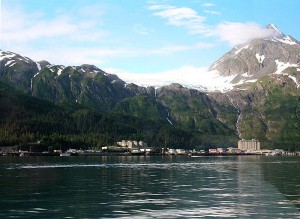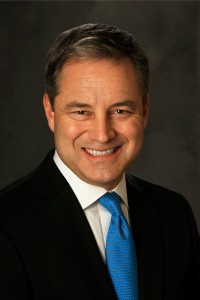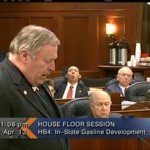 The session that finally put an end to the current chapter of the decades-long tax debate, the one that has seen political careers ruined, millions of dollars spent, a state fractured. The one that’s pitted Alaskans against Alaskans, party member against one another. The one that began when former Gov. Sarah Palin took the help and helped her rise to the national stage. The one that since, has stoked fear in the hearts of some Alaskans, and the one that made long time Alaskans who were here before oil wonder what had happened to their state.
The session that finally put an end to the current chapter of the decades-long tax debate, the one that has seen political careers ruined, millions of dollars spent, a state fractured. The one that’s pitted Alaskans against Alaskans, party member against one another. The one that began when former Gov. Sarah Palin took the help and helped her rise to the national stage. The one that since, has stoked fear in the hearts of some Alaskans, and the one that made long time Alaskans who were here before oil wonder what had happened to their state.
The one that will now give billions of dollars back to some of the largest companies in the world in hopes that they will stay in the state and produce more oil and continue to nearly completely fund state government.
That very debate officially ended when both chambers gaveled out at midnight Monday morning—the first time since 2010 that it wrapped up in time–to relatively little fanfare. All told, the legislature passed 71 bills, including a controversial 737-mile in-state gasline that had been debated for years. (Read more on that here).
But the real story of the session was the oil tax bill, which for all intents and purposes ended when it passed the in the wee hours of Sunday morning.
In prior years on a night like that, as politicians grandstanded in the chamber, as amendments were offered and killed, hallways would be chalked full of lobbyists and citizens showing up for the spectacle. Pizza boxes would have piled up. Soda cans tipped. Harried aides would have been flitting about carrying stacks of paper to harried legislators.
This time it was different. As Saturday night turned into Sunday morning, there were only a few scattered observers in the hall outside of the chamber. As the last business was wrapping up at 2 a.m., the only person left was the security guard roaming a long empty hall.
The lack of excitement was due to many things, the first being that the votes were locked in early. This, in part, was thanks to Senate President Charlie Huggins, House Speaker Mike Chenault and House Finance Chair Bill Stoltze, all three of whom herded the cats and kept trouble, real trouble at bay. (Gov. Sean Parnell, it should be noted, kept his distance, which is one way of putting it. Others in the Capitol building weren’t nearly as kind when referring to his absence.)
It was also probably due to an electorate that chose to usher in Republicans in both chambers. The Republican Senate Majority’s motto is “Time to Act,” and act they did. Sen. Fred Dyson probably said it best when he said, “What a difference an election makes.”
Mostly everybody just seemed wary from the battle. On the surface, and when the cameras were on them, it looked like the Dems and others opposed to the tax bill were fighting vigilantly. Off camera, they looked defeated. They knew the score, and they knew that it was not in their favor.
Some of them who have lived this battle session after session, year after year, knew that you can only fight so hard against that which you have allowed yourself to become so dependent.
That’s not to say that the oil companies, the majors at least, got what they wanted. (The independents got all they wanted and more. More on that later.) The tax break will cost the state, at current projected prices and at current production, somewhere between $650 million to more than $1 billion a year. During committee testimony, the companies said that it was too little of a tax break to really stem production declines.
They all said the flat 35 percent tax is too high, the $5 per barrel exempted for all produced oil too low, and the tax credit for new oil not generous enough. In fact, there was talk that at least one of the major hated the bill and wanted to kill it through amendments offered in House Resources, chaired by Rep. Eric Feige but controlled by Rep. Mike Hawker. Among other things, the amendments offered in Resources by Hawker lowered the base rate, and significantly decreased state accounting oversight.
Had those amendments survived the bill would not have passed the Senate. (Rep. Bill Stoltze, who knew that, stripped out the amendments in Finance and kept the capital budget in committee until he was assured that those amendments wouldn’t make their way back into the bill.)
You could heat Juneau with the paper that was printed this year alone devoted to charts and graphs and powerpoints. Citizen legislators worked extraordinarily hard to figure it all out. And still nobody really knows—in this state at least– what the tax break does or how it’s going to work.
But what is clear is that since the state raised oil company taxes in 2007, Alaska has been used by the majors as a cautionary tale around the world of what happens when an oil province dares to take on an industry that feeds it, literally. Raise our taxes and we’ll decrease production, the majors said. We’ll starve you out, they warned. Just look at Alaska, they said.
It may be true. It may not be true. The oil is indeed running out, as it was bound to. Prudhoe Bay—the largest oil field in North America– began pumping from its vast reservoir in 1977. Most of the easy oil from that field is gone. New technology is supposedly available to squeeze more oil out of the ground, but that could only happen if the tax rates were lower, oil companies argued. And argued, and argued. And they did that here in the state with enough Chinese-water torture type insistency that the citizens here said enough.
Now eyes, both here and around the world, are going to be on the industry, to see if those companies will make good after such a large tax break. The testimony that it wasn’t likely big enough to stem decline will be lost on most. All the public will remember is that Alaska reached out its hand. If they don’t take it, then they’ll likely be punished, again, as they were in 2007 after Palin took over.
And it will happen sooner or later. The pendulum will swing back. And forth. Again and again, as it has been swinging since Prudhoe was discovered in 1968. Whole legislative sessions will be devoted to oil taxes. The best minds in the state will be busy working on it. Bumper stickers will be plastered on cars and slogans will be used to further careers, and the state, as it has been, will be consumed. We will all be consumed with oil taxes as our schools continue to be some of the worst performing in the country, as our sexual and domestic violence rates are some of the highest in the country, as our citizens continue to be divided. We will all be consumed with oil taxes as the oil steadily runs out, and we will be consumed with oil taxes as we don’t try other things, don’t try to get our money elsewhere, as we don’t plan for what happens when that day comes.
Indeed, even before the Senate concurred with the House changes to SB 21 on Sunday afternoon, there was already talk about plans being made by the majors to come back next year to get some additions and changes that they were hoping for. That will likely be another fight. It will likely last for years.
Contact Amanda Coyne at amandamcoyne@yahoo.com


 During Gov. Sean Parnell’s tenure, Alaska Department of Labor hired Judge Paul Pozonsky who was being actively and openly investigated by the Pennsylvania Attorney General’s Office at the time of his hire. Pozonsky has been charged for pilfering cocaine while on the bench in Pennsylvania. He is the brother-in-law of Chuck Kopp, a short lived Alaska public safety commissioner under Palin and current staffer for Alaska state Sen. Fred Dyson.
During Gov. Sean Parnell’s tenure, Alaska Department of Labor hired Judge Paul Pozonsky who was being actively and openly investigated by the Pennsylvania Attorney General’s Office at the time of his hire. Pozonsky has been charged for pilfering cocaine while on the bench in Pennsylvania. He is the brother-in-law of Chuck Kopp, a short lived Alaska public safety commissioner under Palin and current staffer for Alaska state Sen. Fred Dyson.



















